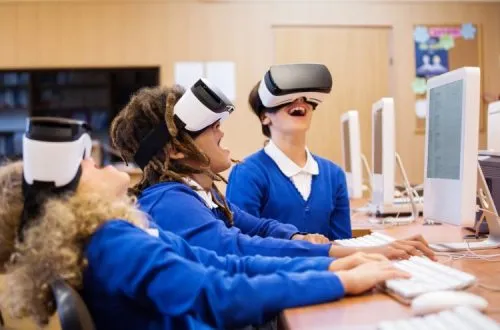JAKARTA, incaschool.sch.id – As we navigate the complexities of the 21st century, the future of education is evolving at an unprecedented pace. With technological advancements, shifting pedagogical approaches, and changing societal needs, the landscape of learning environments in schools is undergoing significant transformation. In this article, we will explore key trends that are shaping the future of education, highlighting innovative practices and insights that promise to enhance the learning experience for students.
Understanding the Future of Education

The Shift Towards Student-Centered Learning
One of the most prominent trends in the future of education is the shift towards student-centered learning. This approach emphasizes the active participation of students in their own learning processes. Rather than being passive recipients of information, students are encouraged to take ownership of their education. Educators are adopting methods that promote critical thinking, creativity, and collaboration, allowing students to explore topics that interest them deeply.
Integration of Technology
The integration of technology in education is another significant trend shaping the future of education. Digital tools and resources are becoming increasingly prevalent in classrooms, providing students with access to a wealth of information and learning opportunities. Technologies such as virtual reality (VR), augmented reality (AR), and artificial intelligence (AI) are enhancing the learning experience by creating immersive and personalized educational environments.
Key Trends Influencing Learning Environments
1. Blended Learning Models
Blended learning combines traditional face-to-face instruction with online learning components. This hybrid approach allows for greater flexibility and personalization in education. Students can learn at their own pace, accessing online resources and participating in interactive activities that complement classroom instruction. As schools adopt blended learning models, the future of education looks promising, with a focus on catering to diverse learning styles.
2. Project-Based Learning (PBL)
Project-based learning is gaining traction as a powerful pedagogical approach that fosters collaboration and real-world problem-solving. In PBL, students work on projects that require them to apply their knowledge and skills to address complex issues. This hands-on approach not only enhances engagement but also prepares students for the challenges they will face in the workforce. As PBL becomes more prevalent, it significantly contributes to the future of education by promoting critical thinking and teamwork.
3. Social and Emotional Learning (SEL)
Recognizing the importance of emotional intelligence in education, many schools are incorporating social and emotional learning (SEL) into their curricula. SEL focuses on developing students’ emotional awareness, empathy, and interpersonal skills. By prioritizing SEL, educators are preparing students to navigate the complexities of life beyond academics. This trend is essential for the future of education, as it fosters well-rounded individuals who can thrive in diverse environments.
4. Flexible Learning Spaces
The design of learning environments is also evolving to support the future of education. Traditional classrooms are being transformed into flexible learning spaces that encourage collaboration and creativity. These spaces often include movable furniture, technology integration, and areas for group work. By creating adaptable environments, schools can better meet the needs of diverse learners and promote active engagement.
5. Lifelong Learning Mindset
The future of education is increasingly focused on fostering a lifelong learning mindset among students. As the world continues to change rapidly, the ability to adapt and learn new skills is crucial. Educators are emphasizing the importance of curiosity, resilience, and a growth mindset. By instilling these values, schools are preparing students to be lifelong learners who can navigate an ever-changing landscape.
The Role of Educators in the Future of Education
Embracing New Pedagogies
As the future of education unfolds, educators must embrace new pedagogical approaches that align with contemporary learning needs. This includes adopting student-centered methods, integrating technology effectively, and facilitating collaborative learning experiences. Teachers are becoming facilitators of learning, guiding students in their exploration and encouraging them to take initiative in their education.
Professional Development and Training
To thrive in the evolving educational landscape, educators must engage in continuous professional development. Training programs that focus on innovative teaching strategies, technology integration, and SEL practices are essential for equipping teachers with the skills needed to navigate the future of education. Ongoing support and collaboration among educators can foster a culture of innovation and growth within schools.
Challenges and Considerations
Equity and Access
While the future of education presents exciting opportunities, it also raises important questions about equity and access. Ensuring that all students have access to technology and quality educational resources is crucial. Schools must work to bridge the digital divide and provide support for underserved communities to ensure that the benefits of educational advancements are accessible to everyone.
Balancing Technology and Human Interaction
As technology plays a more significant role in education, it is essential to strike a balance between digital tools and human interaction. While technology can enhance learning, the social aspect of education remains vital. Educators must find ways to integrate technology in a manner that complements and enriches face-to-face interactions, fostering meaningful connections among students.
Conclusion
The future of education is bright, filled with possibilities for transforming learning environments in schools. By embracing student-centered approaches, integrating technology, and prioritizing social and emotional learning, educators can create dynamic and engaging experiences for students. As we navigate these trends, it is essential to remain mindful of equity and the importance of human connection in education.
As we look ahead, let us embrace the future of education with optimism and a commitment to fostering environments that promote growth, creativity, and collaboration. By working together, educators, students, and communities can shape a brighter future for all learners.
Improve Your Abilities: Explore Our content on Knowledge
Take a Look at Our Latest Article on Critical Analysis!


